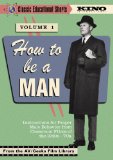| Reviews & Columns |
|
Reviews DVD TV on DVD Blu-ray 4K UHD International DVDs In Theaters Reviews by Studio Video Games Features Collector Series DVDs Easter Egg Database Interviews DVD Talk Radio Feature Articles Columns Anime Talk DVD Savant Horror DVDs The M.O.D. Squad Art House HD Talk Silent DVD
|
DVD Talk Forum |
|
|
| Resources |
|
DVD Price Search Customer Service #'s RCE Info Links |
|
Columns
|
|
|
Classic Educational Shorts, Volume 1: How To Be A Man
Kino International, under their Classic Educational Shorts label, has released How to Be a Man, Volume 1, a collection of 12 vintage classroom instructional films produced from the 1940s through the 1970s. Gathered together from Skip Eisheimer's personal A/V Geeks Film Library, these speedy, tightly-focused (and sometimes strikingly filmed) "social guidance" shorts don't always deal strictly with male maturation issues as the disc's title suggests (several of the shorts' subject matters address problems that both boys and girls deal with growing up). And while certainly kids today watching these films might have a tougher time appreciating the messages buried within the sometimes stilted conventions utilized for such educational films at this time, the themes and ideas and warnings and questions presented here don't seem too terribly different than from what goes on with kids at home and in school today. Let's look very briefly at each title.
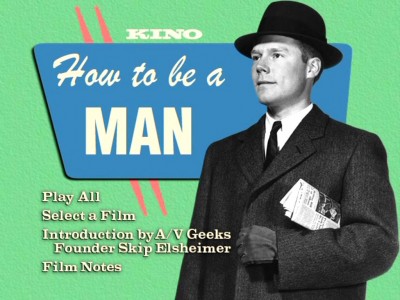
Fears of Children
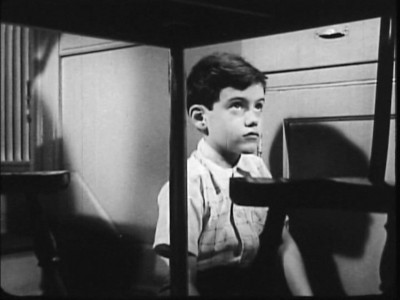
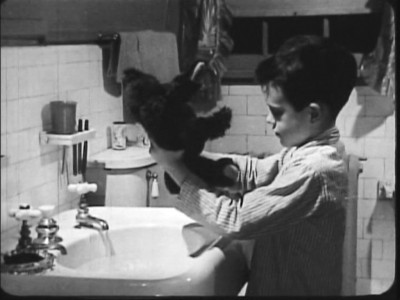
Number 3 in the Oklahoma State Department of Health's series of educational films, in conjunction with the National Association for Mental Health, and produced by Julien Bryan, International Film Foundation Productions, Fears of Children is an utterly creepy little Hitchcockian/Freudian nightmare, stylishly directed by writer Francis Thompson. You see...little Paul doesn't feel loved at home. He's overprotected by his fear-mongering mother, and frightened to death by his brash, turtle-kicking father. So Paul...coldly drowns his teddy bear in the bathroom sink. With his little hands clenched tightly around the bear's neck. Look out, Daddy. This is a striking short, nicely directed by Thompson, with an attention to the mise-en-scene that's almost unheard of in films like these. Thompson uses a series of menacing, low-angled shots and extreme close-ups to forcefully get across the plight of poor Paul, who's either ignored by his parents, or smothered by their unrealistic expectations. If you buy Freud, Paul's dream at the end of the film - his return to the cave where he first became scared (womb imagery) and the terrifying threat of the killer bear (the teddy bear he strangled and drowned, representing his father) - is a dilly. One of the best shorts on this collection, and way ahead of most of these educational shorts; it would play nicely right before a showing of Hitchcock's Spellbound. It runs 27:00.
Am I Trustworthy?
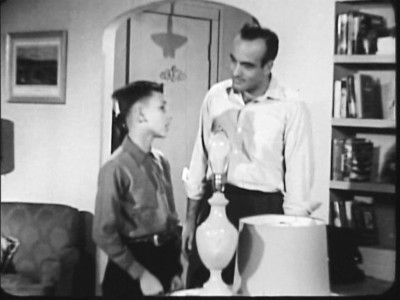
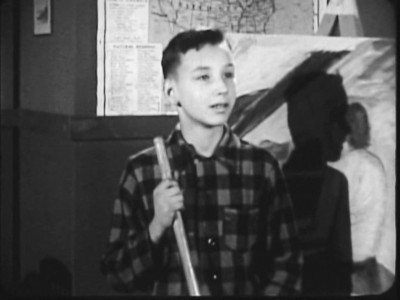
Shot in 1950 by Coronet for The Bureau of Instructional Supervision of The University of The State of New York, Am I Trustworthy? details how morose Eddie Johnson, after losing out as Treasurer for his Hobby Club, listens to his father's lessons on how to be trustworthy in all aspects of life. This short, running 10:00, is much more typical of the kinds of instructional "social guidance" films we all watched in school (at least when I was in Elementary school...during the Punic Wars). There's a kindly narrator who wonders why Eddie can't get his act together, and the set-up is stagey and confined. Eddie listens to his father (who speaks with the advice of a mental health pamphlet) while we see various scenarios of how Eddie could become more trustworthy. Am I Trustworthy? is certainly one of those shorts that contemporary audiences may easily laugh at (it is over-earnest), but its lessons to Eddie are sound: "Be on time, play fair, do a good job, and keep your word." Do that, and maybe someday you can be the Treasurer of your Hobby Club!
Act Your Age
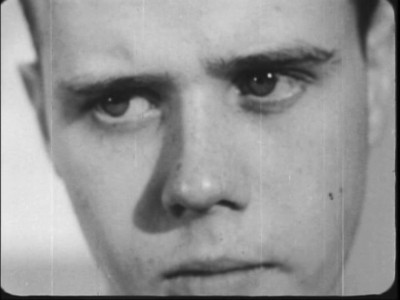
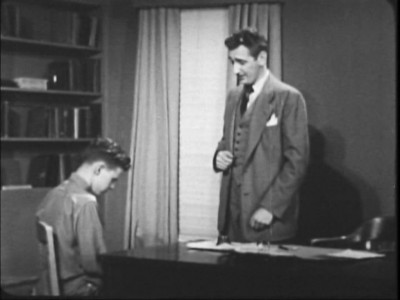
An unintentionally hilarious Coronet short from 1949 which recounts the misadventures of Jim, who, when his mechanical pen runs out of lead, carves his initials in his desk (they were wooden, then) and gets busted. He offers to refinish the desk, but his principal (complete with weasely moustache) wants something...more from Jim. He wants Jim's advice on how to reach all the kids out there, because, "Yes, growing up is a problem." We're then treated to various flashbacks where newly-matured Jim recalls instances of his friends childishly acting out. Obsessively keeping a notebook detailing his present and future "emotional age," Jim finally pesters the principal to the point where he's deemed mentally sound. Act Your Age is a veritable gold mine of set-up lines (when the principal leans back in his chair, looking Jim over, and states, "What we need is some method of measuring your growth, my teenager said, "That's what she said," and I hit the floor), and while any parent would approve of its message, it's almost impossible to take that message seriously here because of the film's form. It runs 12:00.
The Other Fellow's Feelings
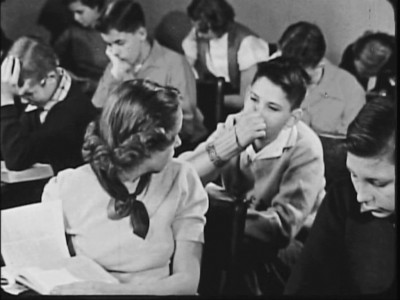

A 1951 Centron production for Young American Films, in their Discussion Problems in Group Living series, The Other Fellow's Feelings looks at the still-topical subject of bullying in school, as Judy eventually breaks down from the constant teasing by Jack (the kid they cast here looks like a genuine little punk). This title focuses just as much on Judy's reactions and how she could have handled the problem differently (the film suggests that Judy should have ratted out Jack right away before events escalated), as it does with Jack, so its inclusion here is an indication that the How to Be a Man title of this disc might be a bit misleading. Ends with one of those classic, "What would you do?" question marks (a convention of these instructional films that in his interview, curator Skip Eisheimer says was way ahead of its time for 1951). The style of this short may seem dated, but the basic set-up and consequences of the bullying seem pertinent today. It runs 8:00.
Your Body During Adolescence
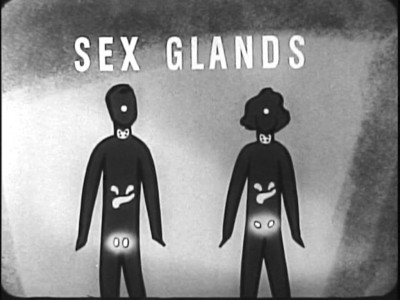
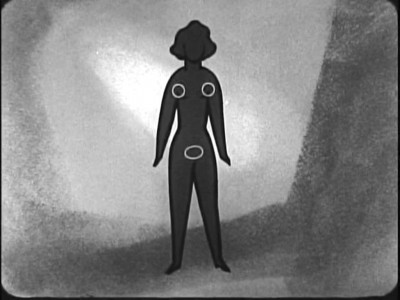
A McGraw-Hill Text-Film from 1954, based on the book, Health and Safety for You by Dr. Harold S. Diehl and Dr. Anita D. Caton. A fairly straightforward presentation of the physical changes associated with puberty, along with a detailing of the functions of the sex organs and the process of pregnancy. Animated in black & white (with some humorously stylized depictions of the sex organs), this isn't Hemo the Magnificent, but it's a clear-cut, frank discussion, none-the-less. The kind of film you could only watch if you had a note from your parents...you know, that film - the one they always showed in the auditorium, first for the girls, then the boys.
The Show-off
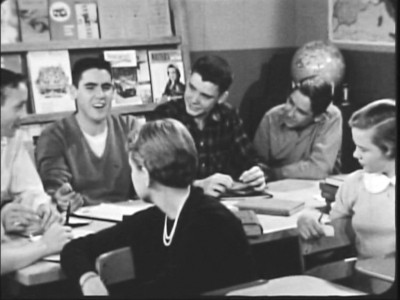
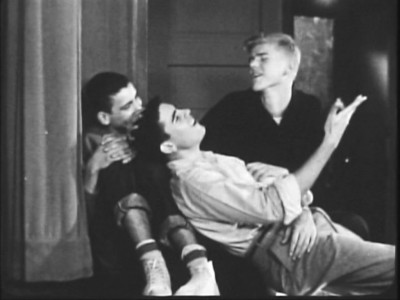
Another in Centron's Young American Films' Discussion Problems in Group Living series, this 1954 short has pretty Kay talking right to us: she thought maybe we could help her with her problem. You see, Jim Brewster is a wise-assed smart-mouth who's giving the entire Junior class a "badge of dishonor." Not only does Jim getting lippy with the teacher (in that phoney, "Whatever did I do, Mrs. Cleaver?" Eddie Haskall b.s.), he interrupts play rehearsal, trips a guy at a party (breaking the hostess' nice glass), and hanging a homemade sign over the entrance to the high school, touting the superiority of Juniors for the whole town to see. The short's best scene is the principal looking for someone to rat-out the culprit, but none of the kids squeal. So instead, he asks the class officers to come up with their own solution to the problem. The kid playing Jim is agreeably obnoxious. It runs 12:00.
Planning for Success
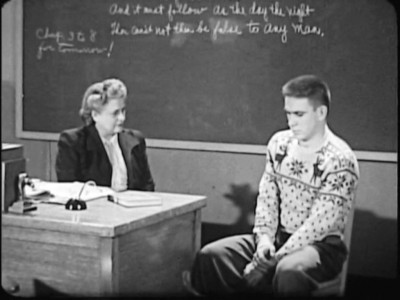
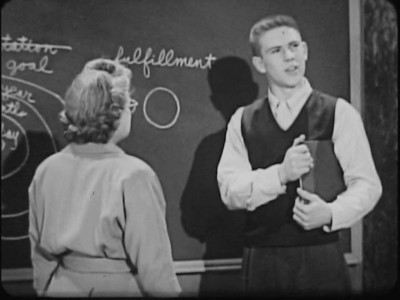
A Coronet production from 1950, with Dr. Clifford R. Adams, Psychology Professor at Pennsylvania State, as the advisor. Kindly spinster teacher Miss Evans (think Aunt Bee with more pluck) is worried about Bill Madison. Bill used to take part in sporting events - like his champion brother, Bud - but now he seems...disinterested. Miss Evans soon learns that Bill has psyched himself out of participating, in large part because his brother set unrealistic goals for the young man to succeed. Miss Evans discusses expectations versus fulfillment, and the light bulb finally turns on for high-jumpin' Bill. Again, another short where the central discussion is still pertinent, even if it the execution is clumsy by today's standards (and don't start feeling superior; twenty years from now they'll be laughing at the stuff you take seriously today). The film's funniest moment (unintentional, of course), is when Bill, a full two hours later, finally understand's Miss Evans' painfully obvious analogy between Bill and the little boys playing football; Bill obviously took one too many high-jump falls on his head. Remember: positive thinking is the key to success! It runs 10:00.
Moment of Decision!
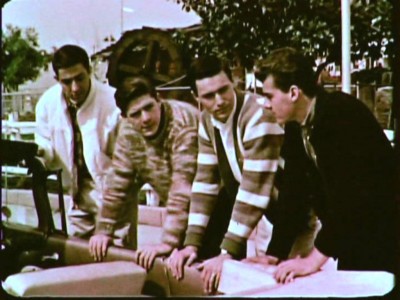
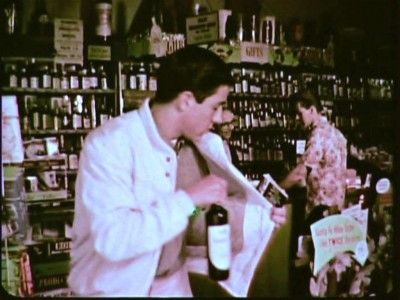
One of my favorites on this collection, this 1954 Sid Davis production (in mostly pink COLOR!) looks at future joyriders Robert, John, Bill and Paul. The narrator, Timothy Farrell, firmly states we are all products of our environment, and then sets out to prove his theory by showing us the previous events in our car thieves' lives that excuse their present bad behavior. Made through the auspices of both the Inglewood Police Department and School system, Moment of Decision!'s warnings about peer pressure, attention-getting, and the "vicious child/parent cycle" would be old hat for these kinds of "social guidance" films if it wasn't for Farrell's breathlessly sneering narration. Sounding almost like a parody of Jack Webb's Dragnet, Farrell cooly snarls when the boys are making up their minds about taking the car: "It's not a childish prank or a misdemeanor...it's a felony!" Some cool hipster jazz in the background and Farrell's seemingly endless disapproval (which just builds and builds) makes this the sharpest Dragnet episode never filmed. It runs 10:00.
Car Theft
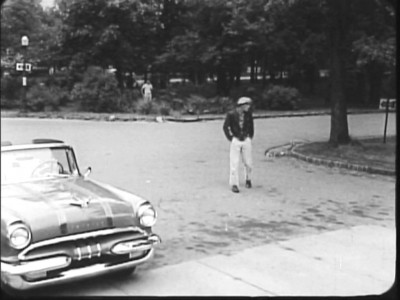
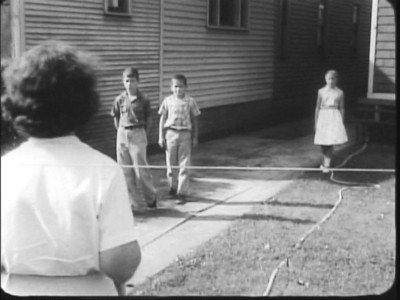
A Bray-Mar production for the Buffalo Youth Board and the New York State Youth Commission, this sly little short looks at a couple of punks who go for a joy ride...with tragic results. I love the insinuating, almost parodistic narration as the hipster narrator makes all kinds of intimations about what's really going on that we can't see on the screen ("Looks like Mike's found a friend."). But just when you think the short is only going for that tone, the ending comes out of nowhere, and it's beautifully staged by the director. The joyriders meet their inevitable fate, plowing down a small girl on a sidewalk. At the moment of impact, the director cuts to the little girl's mother, who hears a small bird cry. Three young children come to tell the mother of the little girl's death, but they only stand their silently (perfectly framed in the background). And as the mother sobs over the body, she reaches over and turns off the child's dancing clown toy. Perfection.
Dance, Little Children

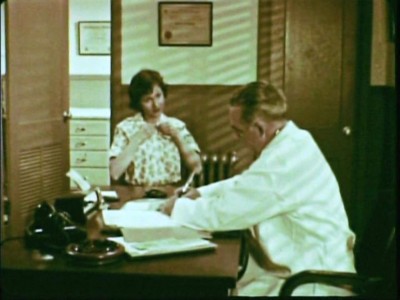
A Centron production from 1961 (again, in COLOR!) for the Kansas State Board of Health and the U.S. Public Health Services, this little medical thriller focuses on an insidious outbreak of syphilis on Main Street, U.S.A.. Poor Lynn Corwin (and I mean financially poor, as well) is overwhelmed by the largesse of rich-boy Hal Grover on their first date (he takes Lynn in her homemade dress to the country club - a big red flag), and she sleeps with him. Unbeknownst to her, though, Hal's an insensitive horn dog who'll apparently screw anyone, because he literally picked a girl up off the streets and took her to a motel, while his friends snorted and jeered outside in the car. And that's where the manhunt begins to track down the source of the epidemic. Far more daring than most mainstream Hollywood studio films at that time (yes: nice girls like Lynn have sex and get V.D.; hero/creeps like Hal will screw anything that moves), Dance, Little Children squarely puts the blame on the advertising age for promoting unrealistic views about sex, and then constantly shoving those sex-saturated messages in young people's faces. Some genuinely realistic moments (the small-town doctor who just can't believe little Lynn, who he delivered, has syphilis), along with some surprisingly frank depictions of clueless parents (I love the father who's actually proud his "panty-waist" son finally had sex - regardless of the fact that he contracted V.D.!). A fairly nervy little film, with some actual suspense as the authorities try to track down the sources of the infection, with a realistic ending: the girl who first gave Hal a dose of the clap is seen walking the streets - unknown and uncounted.
The Decision is Yours
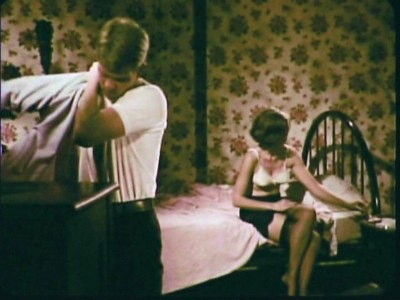
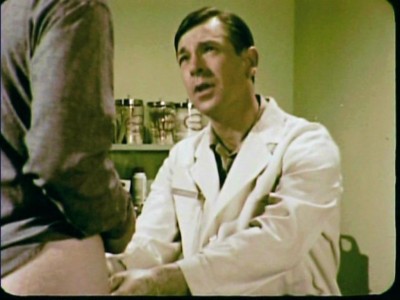
Produced by Calvin Productions for the U.S. Navy, young swab Bill has knocked up his pretty girlfriend (on the third date - not bad), and now she wants to know what he's going to do about it. She doesn't want to get married, and she knows Bill doesn't, either, but what is she going to do when her parents are mortified (and when her father wants to kill Bill)? Bill gets some (questionable) advice from one of his superiors before walking off on the beach, as we ponder what Bill will do. However well-intentioned The Decision is Yours may have been at the time (and it does ultimately impart a valuable lesson: keep it in your pants, guys, unless you're willing to take responsibility for the consequences), some outdated thinking about women and sex makes it difficult to take too seriously today. According to the film, women don't get aroused as easily as men, and she basically doesn't like sex just for sex's sake: she wants a deeper relationship. Oh, and masturbation isn't a totally satisfying experience. Advertising is again bashed here, as it was in Dance, Little Children, while the narrator tells Bill, "Well...you sure screwed things up, didn't you?" That's George's boss, Mr. Wilhelm, from Sienfeld, as the superior officer with the sometimes shaky advice.
From Rugs to Riches


A 1956 Caprolan Production for Allied Chemical, this wonderfully funny little short stars the great Jonathan Winters in a variety of roles in this corporate promo piece that was no doubted screened at company meetings and sales conferences. It's clear Winters is improvising lines on the spot as he essays the slightly effeminate salesman ("You silly savages!"), or the harried married man shopping for Caprolan Carpet with his nagging wife ("I told you not to touch my arm."), and he's wonderful, as always (my favorite is when he's asked what he does when the dog tracks dirt onto the carpet: "I nail his paws to the floor."). Of course with everyone so touchy about P.C. concerns and lawsuits, none of this would probably make it into a corporate promo film today...and more's the pity. Gigantic comedian Pat McCormick is also on hand, lending a bit of button-down humor to this hip satire of the Advertising Age. An unintentionally surrealistic moment comes at the end of the film, though, when shrinkage to the print becomes noticeable, and the image flashes in an out of color, jumping around the frame, giving this beautifully hep, sharp promo spoof an appropriately (and unplanned) bizarre finale. Worth the entire disc alone.
The DVD
The Video
The full-frame, 1.33:1 transfer of the shorts included on the How to Be a Man, Volume 1 disc is fine, with no noticeable compression issues. The actual prints used as source materials here, however, do show various degrees of damage (from fair to heavy), with scratches, dirt, splices, repairs, heavy grain, and washed-out color the norm. But that's exactly how you want to see these films; the only thing missing is the distinctive sound of that Bell & Howell projector. Overall, considering the films - not bad at all.
The Audio
As Kino rightly states, these "orphaned" films do not conform to Kino's usual standard, but the English mono audio track isn't too bad if you're accustomed to the squelchy sound of these prints. And again, that's part of the nostalgia of watching these shorts. No subtitles or close-captions are provided, though.
The Extras
There's an informative 18:53 minute interview with A/V Geeks founder Skip Eisheimer, who gives a brief rundown of the history of educational "social guidance" films, where he also points out some of their themes and motifs of interest to him. And while I might question one or two of his assertions concerning "liberal" and "conservative" trends, overall I found his interview quite edifying. Most importantly, I liked his appreciation for these films for what they are - not for what they should be, or aren't. He recognizes some value in them outside of most people's perception of them as goofs to be laughed at, and no more. He respects them. In addition to the interviw, Skip has authored some short text Film Notes for each title.
Final Thoughts
If you're laughing at the educational shorts included on the How to Be a Man, Volume 1 disc from Skip Eisheimer's A/V Geeks Film Library, that's cool. Most of them are amusing if you just focus on the stylized conventions of the educational/instructional short from this time period. But if you're feeling superior to them, watch out: I can guarantee you that whatever stuff passes for enlightened or cutting-edge "social engineering" today...will be thoroughly debunked and laughed at in twenty years' time. An entertaining collection of classic educational shorts from Kino International (with some genuine "sleeper" classics like Fears of Children, Moment of Decision, Car Theft, and Dance, Little Children), How to Be a Man, Volume 1 may have a bit of a misleading title (often, the subject matters pertain equally to women, too), but there's no question the grouping is superior. Let's get more volumes out quickly. I highly recommend How to Be a Man, Volume 1.
Paul Mavis is an internationally published film and television historian, a member of the Online Film Critics Society, and the author of The Espionage Filmography.


|
| Popular Reviews |
| Sponsored Links |
|
|
| Sponsored Links |
|
|
| Release List | Reviews | Shop | Newsletter | Forum | DVD Giveaways | Blu-Ray | Advertise |
|
Copyright 2024 DVDTalk.com All Rights Reserved. Legal Info, Privacy Policy, Terms of Use,
Manage Preferences,
Your Privacy Choices | |||||||









